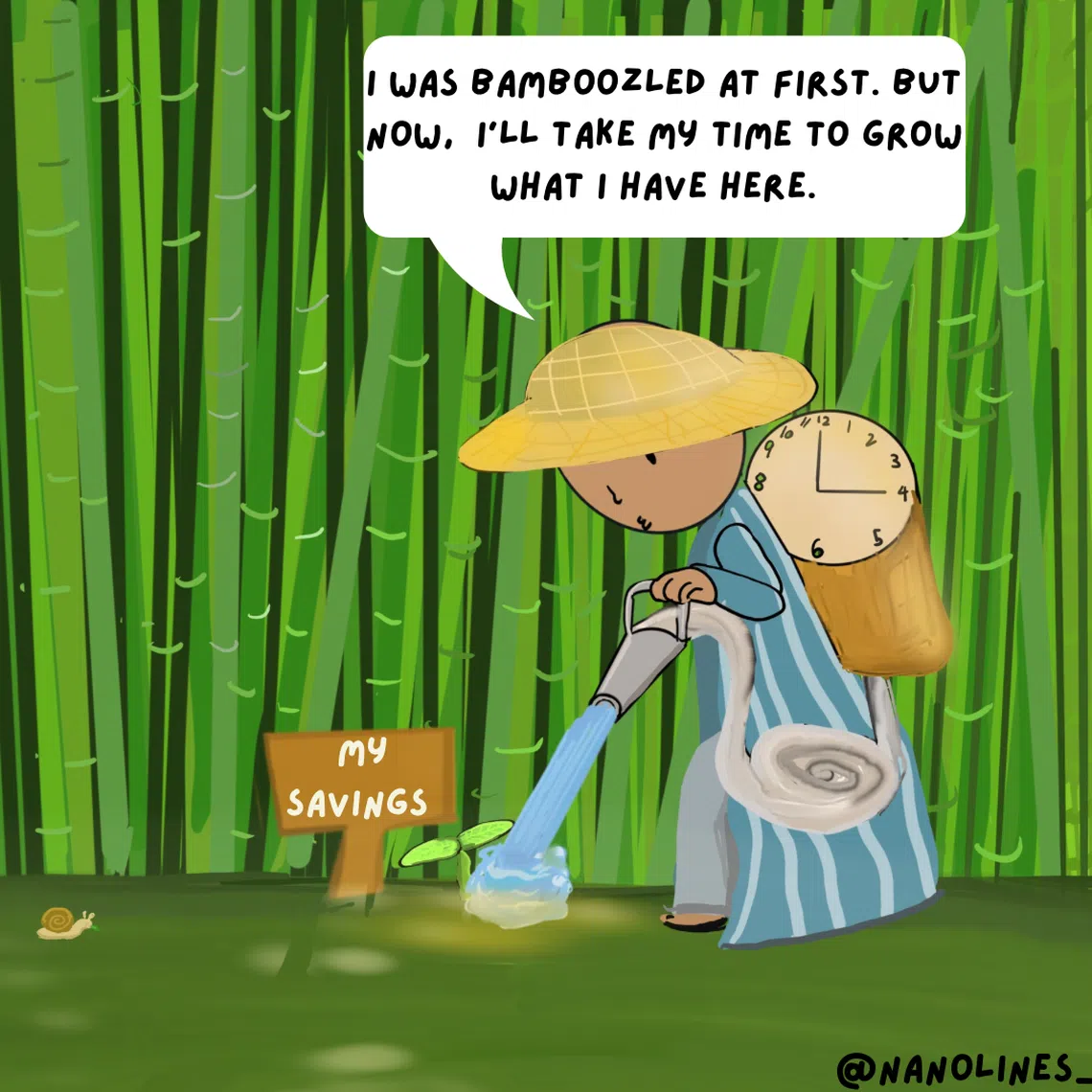💪 (Wo)Man with a plan

- Find out more and sign up for Thrive at bt.sg/thrive
👣 Baby steps
Starting something new is never easy, especially so when it comes to planning your finances. With bills to pay and budgeting to do for daily meals, transport, parents’ allowance and occasional travel, it’s only normal to feel overwhelmed and even lost in your financial planning journey at some point.
According to Loh Yong Cheng, advisory lead at wealth advisory Providend, having clear financial goals can be helpful in paving a steady and organised runway to manage your finances for the long-term.
“Having big goals would likely be overly pressurising for many, especially at the beginning of your financial planning process,” says Loh. “Starting small, in fact, is good to keep things going in a tidy, manageable fashion.”
One example would be to set aside S$50-S$300 per month for savings or investing gradually, just to get things going for yourself. “This would alleviate any fear or pressure of making big losses, especially in the early stages of your financial journey.” You can then work towards allocating 20 to 30 per cent of your salary on savings and investing.
If you’re still feeling inertia about getting started on planning out your financial goals, Loh suggests finding an accountability buddy to help you better move forward on this journey. “It’s kind of like exercise, just that instead of setting physical goals, you’re helping to keep each other in check when it comes to achieving financial goals or making progress with the planning process,” says Loh.
That being said, Loh notes that it is also important to look for someone well-suited to be an accountability partner. “Finding a trusted peer is important, especially when it comes to dealing with finances,” Loh stresses. “Likely, you’d want to avoid someone who could potentially have an agenda.”
Navigate Asia in
a new global order
Get the insights delivered to your inbox.
“In the event that you are paying someone to help with your finances (like a financial advisor), it is also important to check that there is no conflict of interest with that individual,” he adds.
🏇 Ready, set, go?

Think you’re 100 per cent ready to soar towards financial freedom now? Slow down, there’s more. Take a look at some other ways to build a strong 💪 financial foundation for yourself before you leap. 🏃
- Start a simple budgeting plan by first tracking your monthly expenses across main categories such as food, housing, transportation, utilities, and other personal spending (on things such as clothes or cosmetic products). Some apps that could help you with this include MoneyManager, Spendee and Monefy. 📱
- Set aside an emergency fund, usually about three to six months’ worth of income – you never know when a rainy day might come.
- Cover yourself with basic health insurance, before possibly moving onto other types that deal with critical illness and personal accidents. Note: Do check on insurance policies that your parents might have already bought for you, such as term life cover from the Dependants’ Protection Scheme or Central Provident Fund (CPF) savings.
- Explore T-Bills and Singapore Savings Bonds (SSBs) to get started on acquiring some returns on your existing savings. (While they might not generate a very high amount of returns in the long run, they’re a good place to start!)
- Put your savings or salary into high interest-yielding accounts, with examples like the DBS Multiplier Account, OCBC 360 Account or UOB One Account. This is a good way to inflation-proof your money, while working towards your long-term financial goals.
- Increase your financial literacy by reading, watching or listening to trusted resources (like books, reliable videos or podcasts) and consistently updating your knowledge base in this area. Regulations and technology evolve rapidly, and often undergo frequent changes. This means it’s important to keep up to speed with the latest updates in the industry, and understand how it affects your money.
🕰️ Gift of time
If you still feel that getting your finances in order is an insurmountable task, there’s one last piece of good news: as a young adult, time is on your side.
“What young adults have is time. As the road ahead is long, this means that there is flexibility to try out different ways to maximise their savings, and look at investments that appreciate best over a longer time horizon,” says Loh. He adds that it is normal to take detours, make mistakes and change strategies several times in the early years of one’s financial planning.
Perhaps the reality is that we’re all trying to figure out how to manage our finances in a way that works best for us. Comparing who’s ahead and who’s not is a losing game, as everyone begins with differing levels of financial literacy and has different goals. As much as we’ve been told time and again that the best time to start planning was yesterday, it’s important to remember that the second-best time to start is now.

TL;DR
- Make clear financial goals for yourself and a firm timeline to motivate you to achieve them ✍️
- Find a peer you can trust and work together to get your finances organised 👬
- Always put aside a good amount of spare cash in case of any emergencies 🚑
- Remember to keep up your financial knowledge consistently, but be cautious of content online 👹
- Be patient with yourself – everyone is learning something new on their financial planning journey 🌱
Copyright SPH Media. All rights reserved.